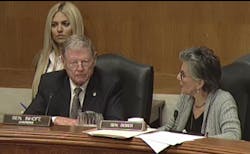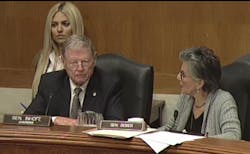100 days and counting: Hope for the best, but expect highway bill extensions
By the end of the week, there will be 100 days to go before federal funding expires for highway projects. And if Interstates could be paved with bipartisan good intentions, trucks would have smooth roads indeed.
Alas, even as leaders from both sides of the aisle recognize the need for a multi-year transportation program, another short-term patch becomes all the more likely.
On Wednesday, Environment & Public Works, the committee charged with the policy portion of the highway bill in the Senate, convened a panel representing state DOTs responsible for building and maintaining the roads and the businesses which depend on them.
“You have a proud, outspoken liberal and a proud, outspoken conservative in total agreement on what we should be doing,” said Sen. James Inhofe (R-OK), chairman of EPW.
Ranking member Barbara Boxer of California, who chaired the committee for the MAP-21 authorization, acknowledged that she and Inhofe “don’t agree on a lot,” but they do agree on the importance of transportation.
She added that she is “very worried” about the “lackadaisical” attitude in the broader Congress—one that is “absurd” and will lead to “another extension.”
“I’m very calm on the outside, but on the inside I’m not calm—I don’t like where we’re headed. The only action I see is from this committee,” Boxer said. “Where is everybody else? They all say they want to do something, but they all said that last time. This is about the country: ‘One nation, under God.’”
But EPW’s self-congratulations for being a beacon of bipartisanship is not news. Nor, particularly, was the testimony of witnesses who emphasized the need for stability—and the very real, very high cost of lingering uncertainty—in the federal government’s transportation funding program.
The key factoid from the Q&A is that more than 4 in 5 states have managed to find ways to increase transportation funding since Congress last raised the tax on gasoline and diesel in 1993—and in recent years the state policymakers who did so were reelected at a 90 percent rate.
“Users need to understand what they’re paying for and what they’re getting,” said Carlos Braceras, executive director for the Utah DOT. “A gas tax is very direct way to do it: People understand where it’s coming from and where it’s going.”
The owner of a small, Pennsylvania-based manufacturer called on Congress to show leadership on the matter, and called the inability to come up with an infrastructure program—an investment with obvious returns— “incomprehensible.”
“The American public will buy something that is a good deal,” said Walt Rowen, president of Susquehanna Glass Co. “The fear, the concept of raising taxes can be mitigated by leadership.”
Steve Heminger, currently with the San Francisco area planning organization, previously served on National Surface Transportation Policy and Revenue Study Commission—a group chartered by Congress under SAFETEA-LU, the 2005 highway bill.
“We spent two years looking for an alternative to the gas tax and couldn’t find one,” he testified.
Inhofe agreed, somewhat. And, he suggested, it was misleading and a political mistake to have called it a ‘gas tax’ in the first place.
“I’d like for us not to talk about a ‘gas tax increase,’” Inhofe said. “It is a ‘user fee.’ User fees are popular.”
More politically interesting, Inhofe also emphasized the federal government isn’t designed to do many things, but managing interstate transportation is one of them.
Indeed, Inhofe several times recalled that 25 years ago he had been one of the “fathers” of the idea to return responsibility for planning and funding transportation entirely to the states.
That notion is increasingly popular again among conservatives, who tout the reforms offered by the Transportation Empowerment Act—but the concept, now called “devolution,” doesn’t work in reality, Inhofe argued.
“It was more fun to be for it than against it,” he quipped, but added the Constitution directs Congress otherwise. “The conservative position is to do an authorization bill. If you don’t, it’s going to cost 30% off the top—and that is not the conservative position. Interstate commerce doesn’t stop at state boundaries. No state is an island.”
Also Wednesday, Transportation Secretary Anthony Foxx continued to bang the Obama administration drum. Having just returned from a #GrowAmerica bus tour of the Southeast, Foxx headlined the annual “Washington Briefing” of the American Association of State Highway and Transportation Officials (AASHTO).
As our man Sean Kilcarr reported from the scene Wednesday, Foxx’s message was simple enough for those on the front lines: “Tell the truth” to Congress, and let them know how the world works outside the Beltway.
Key congressional transportation leaders will likely get that “unvarnished truth” when they visit the roadbuilders on Thursday—look for additional insightful coverage from Mr. Kilcarr.
Foxx, meanwhile, heads to Capitol Hill for an expected grilling from the transportation subcommittee of House Appropriations. The committee charged with finding a way to pay for roads is expected to be less sympathetic to the Obama administration’s ambitious, six-year, half-trillion dollar plan than was the House committee who only has to decide what the nation—and trucking—needs.
Stay tuned.
About the Author
Kevin Jones
Editor
Kevin has served as editor-in-chief of Trailer/Body Builders magazine since 2017—just the third editor in the magazine’s 60 years. He is also editorial director for Endeavor Business Media’s Commercial Vehicle group, which includes FleetOwner, Bulk Transporter, Refrigerated Transporter, American Trucker, and Fleet Maintenance magazines and websites.
Working from Beaufort, S.C., Kevin has covered trucking and manufacturing for nearly 20 years. His writing and commentary about the trucking industry and, previously, business and government, has been recognized with numerous state, regional, and national journalism awards.



